Compiled by Tzu Chi Monthly editorial staff
Abridged and translated by Wu Hsiao-ting
Photos courtesy of Tzu Chi USA
Sierra Leone, one of the world’s poorest nations, has seen a decade of collaboration between Tzu Chi and three nonprofit partners to aid the poor and vulnerable. Now, the focus is shifting toward self-sufficiency.

Volunteers from Tzu Chi’s partner organizations in Sierra Leone lay stones over a muddy road to make it passable. In 2024, while delivering rice to the southeastern region, they encountered impassable roads due to heavy rain and had to find ways to continue their journey. Courtesy of Tzu Chi Hualien headquarters
Passengers made their way to immigration after their plane touched down at Freetown International Airport in Sierra Leone. Among them was Tzu Chi USA volunteer Debra Boudreaux (曾慈慧), who noted the airport’s fully computerized systems, electric baggage carousels, and jet bridges. Such features are standard at most modern airports but a clear sign of progress compared to what she had seen on earlier visits.
She recalled that during her first trip in 2016, the airport had no jet bridges and luggage was handled manually. Conditions beyond the airport also appeared underdeveloped. What struck her most on this visit, in February 2025, six years after her last in 2019, were the visible signs of development. “Many new buildings were going up,” she said. “Nights were no longer pitch black but lit with lights, and local markets bustled with diverse activity. There has been progress in every aspect of daily life—food, clothing, housing, transportation, agriculture, and commerce. It may be slow, but it is real and visible.”
Tzu Chi began its work in Sierra Leone in March 2015, responding to the Ebola outbreak by providing support to orphans, women, and people with disabilities. That effort sparked a decade-long partnership with local charitable organizations and sustained aid to various institutions. Today, Tzu Chi maintains an office in the country, with staff representing the foundation in government meetings and emergency relief efforts.
In February 2025, Johan Alwall (歐友涵) and Chu Yu-jia (褚于嘉) from Tzu Chi’s headquarters in Taiwan traveled over 14,000 kilometers (8,700 miles) to join Debra Boudreaux for a 15-day visit. Together, they met with local organizations and partners to reflect on the past ten years’ work and plan for future collaboration.
Freetown faces the Atlantic Ocean and is bordered by mountains to the north and east. With an estimated population of over one million, the city faces housing shortages and inadequate infrastructure.
Koindu
Tzu Chi’s connection to Sierra Leone can be traced back to Koindu, an agricultural town in the eastern part of the country, near the Liberian and Guinean borders. Koindu was one of the first areas in the nation affected by the 2013 Ebola outbreak, which ultimately claimed more than 10,000 lives across the three countries.
The virus spread rapidly in Sierra Leone, exacerbated by a weak public health system, the practice of family members caring for the sick, and traditional customs such as washing the deceased. The country recorded the highest number of infections among the three nations. Thousands of children lost their parents, and fear of the highly lethal disease led to the stigmatization and rejection of survivors and victims’ families by their own communities.
In 2015, Tzu Chi began working with Caritas Freetown and the Healey International Relief Foundation to distribute food, tableware, beds, blankets, and other supplies. The Lanyi Foundation joined in 2016. Each year, Tzu Chi applies to Taiwan’s Ministry of Agriculture (formerly the Council of Agriculture) for humanitarian rice aid. Some of the rice is shipped to Sierra Leone for distribution, along with multigrain powder provided by the monastics at the Jing Si Abode, the Buddhist convent founded by Master Cheng Yen that also serves as the headquarters of Tzu Chi.
Koindu is about a five-hour drive from Freetown, including 52 kilometers (32 miles) of rough dirt roads that are difficult to navigate, even with a four-wheel-drive vehicle, and especially during the rainy season. In September 2024, when a Caritas team delivered aid there, their truck became stuck, stranding them there for three days. They ended up relying on motorcycles from nearby villages to transport the supplies.
During their drive to Koindu on this trip, the visiting Tzu Chi team noted clear signs of change. Infrastructure improvements tied to China’s Belt and Road Initiative were helping connect villages with better roads. Roadside vendors remained a familiar sight as they reached the outskirts of Koindu, but new additions included a police station and a mosque. Solar panels of various sizes dotted the landscape, providing electricity.
It was a Saturday, so children were not in school. Some played outside their thatched homes, while others helped their parents with chores. Goats roamed freely along dirt paths. Women gathered to weave crafts or mix sand and soil to make bricks, preparing to expand their homes. Nearby, a group of mechanics repaired motorcycles—the community’s primary mode of transport. These scenes reflected signs of economic recovery in the impoverished village.
Although Koindu has nine public schools, many children orphaned by Ebola still face discrimination and are denied access to education. “What moved me most was Auntie Mary [Mary Sesay],” said Debra Boudreaux. “She founded an orphanage and a primary school to help these children rejoin society. Tzu Chi has supported the school since 2016 with rice and multigrain powder. The children are much healthier now.”
Johan Alwall added that many orphans had been abandoned on the streets. Auntie Mary took it upon herself to find and care for them, ensuring they were fed and clothed, and placing them with foster families. Later, she even provided land for the construction of a school, which was named Smile With Us Primary School. During the team’s visit, lessons written on the blackboard showed the students were receiving a solid education. One or two students were even pursuing university admission.
Victoria, a teacher at the school, is an Ebola survivor. Though she recovered physically, the trauma remains. Grateful for Tzu Chi’s years of support, she became a volunteer. In 2018, she traveled to Taiwan and met Master Cheng Yen in person. She continues to carry the Master’s words in her heart and does her best to serve her community. She hopes the villagers will cherish and make good use of the support they’ve received from Taiwan.
Mobilized by Tzu Chi, Caritas, the Healey Foundation, and the Lanyi Foundation, residents in Kroo Bay clean up their community following flooding in August 2023. Courtesy of Tzu Chi Hualien headquarters
Helping slums
Another stop on the team’s visit was Kroo Bay, an informal coastal settlement in Freetown. Although Kroo Bay is part of the capital, the team felt the air shift from comfortable to stifling upon entering the community, with a heat index well above 26°C (78.8°F). As they walked through tightly packed alleys, a mix of odors filled the air. The ground beneath their feet was not solid earth but reclaimed land made from compacted waste, discarded clothing, and other debris—an area that continues to expand into the sea.
Over the past several years, Tzu Chi has provided assistance to three underserved communities in Freetown: Kroo Bay, Susan’s Bay, and Dwarzark. Hot meals have been served after floods and fires, and cleanup efforts have helped remove garbage. Today, children can play and kick balls in open spaces once cluttered with trash. But challenges remain. Drainage ditches are still clogged with refuse, leading to flooding during the rainy season. Ongoing community involvement is needed to change habits, like littering.
When the team arrived at a football field in Kroo Bay, they were greeted with singing and dancing. In the community meeting hall, nearly 50 representatives from the three communities had gathered to express their gratitude for the long-standing support of Tzu Chi and Caritas. They highlighted the positive impact of flood-prevention cleanups, recycling programs, disaster relief, and firefighting training—efforts that have improved safety and hygiene in their communities. One notable result has been a significant reduction in diseases such as malaria and cholera. Community representatives voiced their hope to obtain machinery to compress recyclables into bales, creating at least one source of income. “Please don’t give up on us,” a representative said. “Give us a chance. One day, even a slum can become paradise.”
The challenges faced by the three communities are much the same. Kroo Bay has a population of between 20,000 and 30,000 people, but there are no proper sanitation facilities—not even a single water tap. Susan’s Bay is equally overcrowded, with most homes built from zinc sheets, mud, or concrete. It also lacks a drainage system. Although an organization once built public toilets and showers, they have largely fallen into disuse due to a lack of user knowledge and maintenance. Fires also remain a serious hazard. In 2024, a devastating blaze in Susan’s Bay left up to 300 households homeless. Dwarzark, built on a hillside, similarly faces persistent fire risk.
The Tzu Chi team met with Freetown Mayor Yvonne Aki-Sawyerr following the visit. They discussed potential strategies for improving these communities in line with the city’s broader urban development plans.
Fire victims gather for a hot meal distribution organized by Tzu Chi USA and Caritas Freetown after a March 2023 blaze in Susan’s Bay left 7,000 people homeless. Courtesy of Tzu Chi Hualien headquarters
Buying rice locally
To help reduce Sierra Leone’s dependence on food imports, Tzu Chi began purchasing locally grown rice in 2022 to supplement its relief distributions. In 2024, for example, 600 tons of rice were donated from Taiwan, but an additional 230 tons were sourced locally.
This local procurement effort led Tzu Chi to become the first major buyer from the Takakleneh Women Farmers’ Association in Kambia, a district in North West Province bordering Guinea. The association, led by Isata Feika Sessy, includes 300 women and 150 men engaged in farming. The farmers expressed gratitude to the visiting Tzu Chi team for the foundation’s support, which has not only provided a stable source of income but also contributed to broader community development. Thatch roofs have been replaced with durable zinc sheets, and traditional farming practices have given way to mechanization. With greater income stability, the farmers now manage their earnings more strategically, saving some in banks for future investments and using the rest for daily expenses, education, and medical care. The government even plans to install solar-powered irrigation systems to further boost agricultural productivity. Together, these improvements have strengthened the farmers’ confidence in their ability to become self-reliant.
The Tzu Chi team also paid a visit to the Ministry of Gender and Children’s Affairs. Minister Dr. Isata Mahoi affirmed that Tzu Chi’s food aid has supported orphanages, temporary care centers, and schools for children with special needs. She also highlighted the foundation’s assistance to survivors of sexual violence, ensuring they receive essential care and support.
In another meeting, this time with officials from the national school feeding program under the Ministry of Basic and Senior Secondary Education, officials shared updates on an initiative carried out in cooperation with Tzu Chi. Since 2018, Tzu Chi has partnered with the government to provide free lunches to students. To date, the program has benefited approximately 20,000 underprivileged students at 70 schools across 15 districts outside Freetown, including 500 children with special education needs.
Father Peter Konteh, executive director of Caritas Freetown, observed that hunger severely affects a child’s ability to learn. He commended the lunch program as reflecting the compassionate philosophy of Master Cheng Yen, who encourages volunteers to serve hot meals after major disasters—to warm hearts and restore strength. Father Peter also praised the multigrain powder provided by Tzu Chi, pointing out its popularity among orphans, elderly residents in nursing homes, and youths in juvenile rehabilitation centers. Most notably, the powder is lovingly prepared by nuns at the Jing Si Abode, making it a gift imbued with unmatched compassion.
Tzu Chi and its partners have long provided supplies—such as multigrain powder, rice, eco-friendly blankets, and shoes—to institutions like the St. George’s Foundation Orphanage in Freetown, helping orphans and individuals with disabilities.
Each is vital
Tzu Chi has worked hand in hand with Caritas, the Lanyi Foundation, and the Healey Foundation for about a decade, with each partner organization contributing to different areas of need.
Caritas has long been active in Freetown, offering a wide range of services, including case management, charitable visits, crop cultivation, and disaster preparedness education in underserved communities. It also assists with customs clearance for rice shipped from Taiwan and compiles recipient lists for distributions.
The Healey Foundation focuses primarily on medical support. In partnership with Tzu Chi, it provides midwife training that requires participants to pass certification exams. Ninety-four individuals took part in the training in 2024 alone. With support from Sierra Leone’s Ministry of Health and Sanitation, the program has helped reduce infant mortality caused by inadequate postnatal care. Plans are underway to expand the training to more remote areas.
The Lanyi Foundation leads vocational training for women and promotes local agriculture. In Bo, Southern Province, it has partnered with Tzu Chi for years to support women with disabilities through initiatives such as sewing classes. With this training, participants have learned to use manual and treadle sewing machines to make everyday clothing and now mass-produce reusable sanitary pads in various sizes, demonstrating remarkable progress toward self-sufficiency.
Together with its local partners, Tzu Chi provided over 240,000 instances of aid in 2024 alone. Boudreaux described the partnership as “a chair with four legs, each one indispensable.” They ensure that the love and care of Master Cheng Yen and Tzu Chi volunteers reach those in need, following the principles of timeliness, prioritization, directness, respect, and practicality.
As the partnership enters its 11th year, how can this spirit of care be sustained? “The most essential thing is to inspire goodness in more people,” Boudreaux said. “That way, everyone becomes a part of caring for their community.”
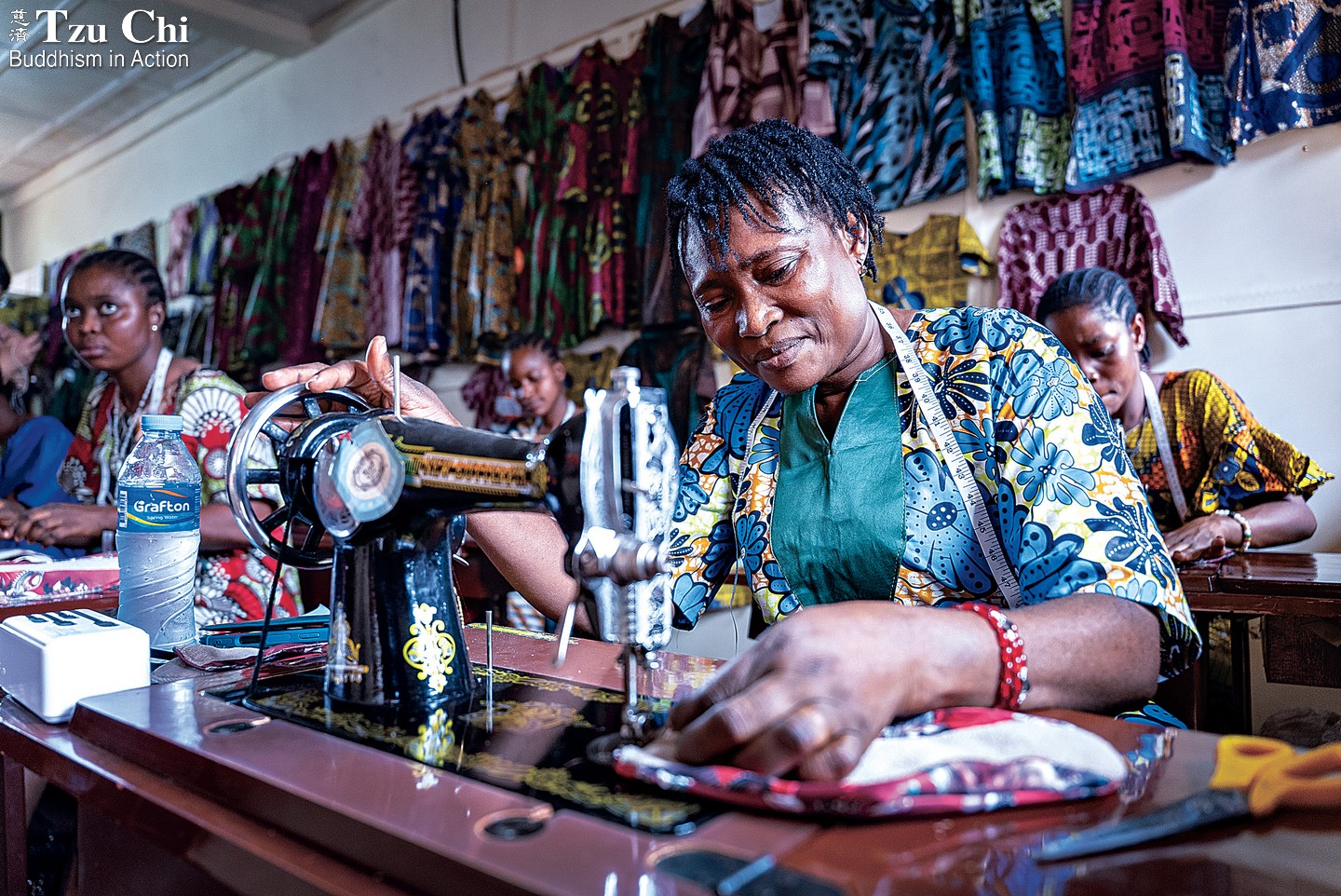
The Tzu Chi and the Lanyi Foundations have for years supported women with disabilities in Bo, Southern Province. Through sewing classes, participants have learned to make everyday clothing and now produce reusable sanitary pads at scale.
Building local capacity
Despite many areas of progress, the country still faces significant challenges. For example, an estimated 12,000 orphans, 7,000 widows, and 5,000 impoverished Ebola survivors remain in need. Tzu Chi continues to provide food aid and has helped more than 700 orphans pursue education or join foster families.
During its first decade in Sierra Leone, Tzu Chi focused primarily on providing aid after disasters, including the Ebola outbreak and devastating floods and landslides. Now entering its second decade, the foundation is shifting toward cultivating local capacity and fostering long-term resilience. More than 30 local volunteers have already joined the foundation to support its work.
Looking ahead, Boudreaux shared that Tzu Chi will continue organizing community cleanups to remove litter and prevent clogged drainage ditches, helping to reduce flooding during the rainy season. “We’ll also continue empowering women farmers, supporting people with disabilities through craftmaking, and purchasing rice locally—these are all part of our ongoing and future efforts,” she said.
Johan Alwall noted during their visit that everyone they met who had received Tzu Chi’s assistance shared a common aspiration: to become self-reliant and give back by helping others. From Ebola survivors and women farmers to government officials, people are working hard to build a better future. “Tzu Chi and its partners are helping to bring about meaningful change,” he said. “My heartfelt thanks go to all Tzu Chi volunteers and members of the public for their continued love and support for Sierra Leone.”
